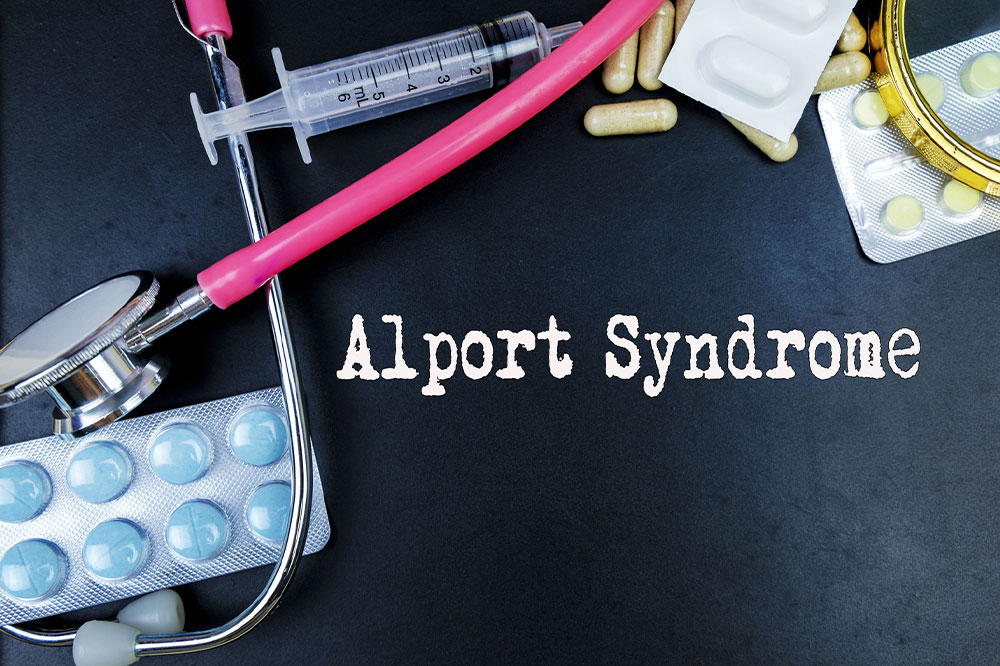
Causes and symptoms of Alport syndrome
Alport is a genetic condition that causes damage to kidneys, develops hearing loss, and compromises vision. The Alport syndrome affects the collagen type IV found in the cleaning units of the kidney, inner ear, and eyes, limiting their function. It is characterized by damaged, tiny blood vessels in the kidneys that can hamper blood filtration and eventually lead to kidney disease or failure. This article highlights the causes, symptoms, and risk factors of Alport syndrome.
Causes
The three genetic types of causes of this condition include the following:
Gene mutation
This gene mutation is caused by affecting the COL4A3, COL4A4, and COL4A5 genes. The responsibility of these genes is to form a part of type IV collagen, a potent protein that’s responsible for supporting your connective tissues. The abnormal collagen found in glomeruli, the cleaning units of the kidney, can restrict the filters from functioning optimally. Hence, the blood doesn’t get filtered as it should by the kidneys, negating the entire function of the system.
Similarly, the abnormal collagen IV present in one’s inner ears can lead to hearing loss. And the collagen IV that ensures the shape of the eye and the color of the retina can get hampered, eventually causing complications associated with the eyes.
X-linked Alport syndrome (XLAS)
This is the most common type of the inherited condition. Also known as the X-linked pattern, this form of condition is inherited by the gene located on the X-chromosome – the COL4A5. That said, the condition may be more severe among men than women, since men carry one X chromosome and women carry two XX chromosomes. Out of the two chromosomes, one can be affected by the gene mutation, suppressing the complications and abnormalities by the second X chromosome.
Autosomal dominant Alport syndrome (ADAS)
This rare form of Alport syndrome is also known as autosomal dominant pattern, and it is caused due to mutation in the COL4A3 gene or COL4A4 gene. This type of genetic disorder is passed down by one of the parents who carry the same condition. The symptoms and the severity of the condition remain same among men and women.
Autosomal recessive Alport syndrome (ARAS)
This form of Alport syndrome affects 15% of cases and is passed down by parents who are both carriers of the Alport syndrome. In that case, the mother and father may each have a copy of the abnormal gene COL4A3 or COL4A4 present. This form of Alport syndrome may cause the same symptoms and intensity of symptoms among both genders.
Symptoms of Alport Syndrome
Since the gene mutation affects different parts of the body like kidneys, eyes, and ears, we will be breaking down the symptoms in these parts.
Kidneys
All forms of Alport syndrome can affect the kidneys. As we learnt earlier that this condition keeps the kidneys from filtering the blood, the below symptoms may occur in that condition:
-Indifferent urine color
-Blood with urine
-Flank pain
-High blood pressure
-Swelling all over the body
Eyes
The faulty collagen IV can also cause many complications associated with eyes and the same are listed below:
-The shape of the lens anterior lenticonus may change and lead to gradual vision loss or cataracts
-This syndrome may also cause corneal erosion, leading to loss of the outer layer of the cornea
-Pain, itching, or redness of the eye, or blurred vision
-A condition called dot-and-fleck retinopathy that changes the color of the retina
-Macula present in the retina makes central vision sharper, and this syndrome may cause a hole that could lead to blurred or distorted central vision
Ears
Abnormal collagen present in the inner part of the ears can cause complications associated with the ears. Also, one thing to remember is that the symptoms of Alport syndrome first start showing in the ears before it causes further damage to the kidneys. That said, remember this cue to get Alport syndrome diagnosed.
– Men with XLAS may experience hearing loss at as early as teenaged years
-Females with XLAS may experience hearing loss caused by this syndrome as an adult
-Incase of ARAS, both the genders may experience hearing loss during childhood
-With ADAS, hearing loss occurs in both genders but at a later stage in life
If you experience any of these symptoms or your parents are the carrier of this gene mutation, it is recommended to run some tests. Detecting the syndrome at an early stage would help manage the symptoms and consider viable treatment options. Some of the tests to run in case of Alport syndrome include BUN and serum creatinine, complete blood count, renal biopsy, and urinalysis.




